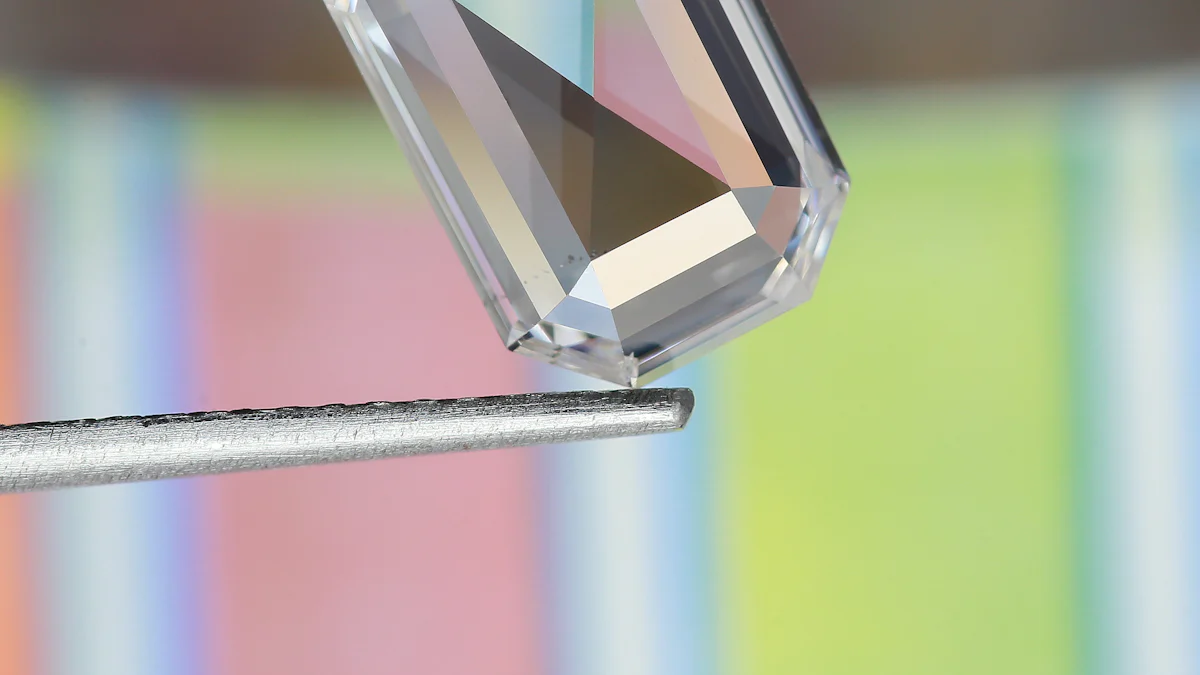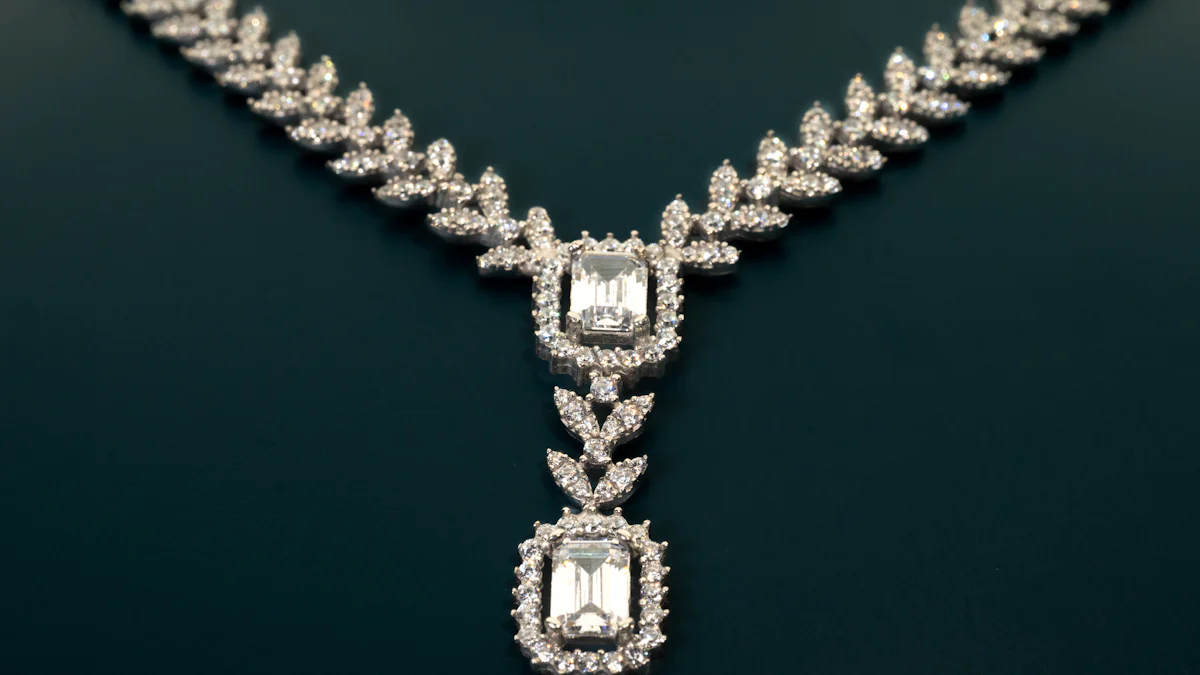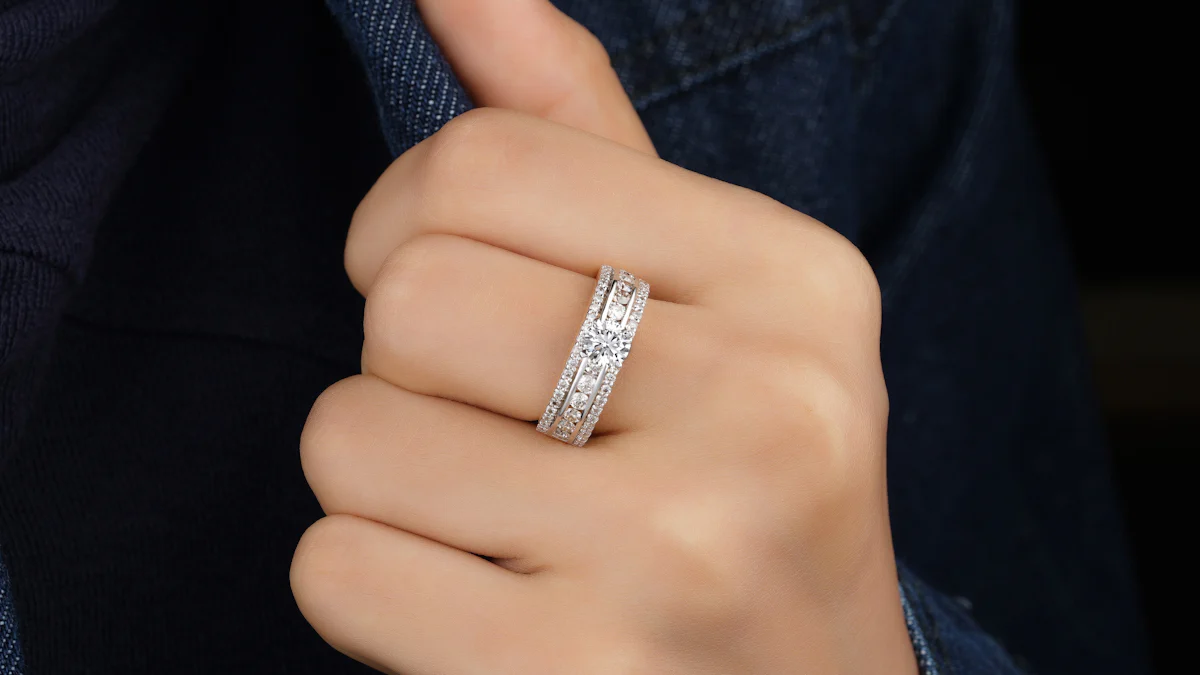Guide to Buying Flawless Diamonds

Owning a diamond flawless symbolizes prestige and luxury. These gems captivate with their unmatched brilliance and rarity. Understanding what makes a diamond flawless is crucial. It involves recognizing the absence of internal inclusions and external blemishes, which sets these diamonds apart. Making an informed purchase decision ensures you invest wisely in this significant financial commitment. The global diamond market, valued at USD 94.19 billion in 2023, continues to grow, highlighting the importance of expert guidance. Consulting a trained professional can help you appreciate subtle characteristics that impact a diamond's performance and value.
Key Takeaways
- Flawless diamonds are the pinnacle of clarity, with no visible inclusions or blemishes, making them a symbol of luxury and prestige.
- Understanding the 4Cs—cut, color, clarity, and carat—is essential for evaluating a diamond's quality and value.
- Flawless diamonds are extremely rare, comprising less than 0.001% of all diamonds mined, which significantly impacts their market value.
- When choosing between Flawless and Internally Flawless diamonds, consider your personal preferences and budget, as Internally Flawless options can offer beauty at a lower price.
- Lab-grown diamonds provide a sustainable and often more affordable alternative to mined diamonds, sharing the same physical properties but typically costing 20-40% less.
- Prioritize cut quality when purchasing a diamond, as it greatly influences the stone's brilliance and overall appearance.
- Always buy from reputable jewelers who provide certification from recognized gemological laboratories to ensure the authenticity of your diamond.
Understanding Diamond Flawless
What Defines a Diamond Flawless?
A diamond flawless represents the pinnacle of clarity in the world of gemstones. You will find that clarity grades play a crucial role in defining this perfection.
Clarity Grades Explained
Clarity grades assess the number, size, type, and location of inclusions and blemishes in a diamond. The Gemological Institute of America (GIA) developed a grading scale that ranges from Flawless (F) to Included (I). A Flawless diamond has no inclusions or blemishes visible under 10x magnification. This level of clarity ensures the free passage of light through the stone, enhancing its brilliance. When you choose a diamond flawless, you select a gem with the highest degree of visual purity.
The Role of the 4Cs: Cut, Color, Clarity, Carat
The 4Cs—cut, color, clarity, and carat—serve as the international standard for measuring a diamond's beauty and value. Clarity, as one of these Cs, refers to the natural flaws within diamonds, including external blemishes and internal inclusions. A diamond flawless excels in this category, offering unmatched visual purity. The cut determines how well the diamond reflects light, while color assesses the absence of hue. Carat measures the diamond's weight. Together, these factors define the overall quality and appeal of a diamond.
The Rarity and Cost of Diamond Flawless
The rarity of a diamond flawless significantly impacts its market availability and cost.
Market Availability
Flawless diamonds are incredibly rare, making up less than 0.001% of all diamonds mined. This scarcity contributes to their high value and desirability. When you search for a diamond flawless, you may find limited options due to their rarity. Reputable jewelers often provide certification from recognized gemological laboratories to ensure authenticity.
Price Factors and Considerations
The cost of a flawless diamond varies based on several factors. These include shape, cut, color, and fluorescence. A well-cut 1-carat flawless diamond can range from $4,000 to $18,000. The rarity of these diamonds, combined with their exceptional beauty, makes them a significant financial investment. When purchasing, consider your budget and lifestyle to make an informed decision.
Flawless vs. Internally Flawless Diamonds

When you explore the world of diamonds, understanding the differences between Flawless and Internally Flawless diamonds becomes essential. Both types sit at the top of the Gemological Institute of America's (GIA) clarity grading scale, but they have distinct characteristics that set them apart.
Key Differences
Clarity Characteristics
Flawless diamonds represent the epitome of perfection. They exhibit no inclusions or blemishes visible under 10x magnification. This absence of imperfections ensures that light passes through the diamond without obstruction, enhancing its brilliance and sparkle. In contrast, Internally Flawless diamonds have no internal inclusions but may possess minor surface blemishes. These blemishes do not affect the diamond's internal clarity but can slightly impact its external appearance.
Impact on Value and Appearance
The absence of any imperfections in Flawless diamonds makes them extremely rare and valuable. Their pristine clarity contributes to their high market value and desirability. Internally Flawless diamonds, while still highly valued, may be slightly less expensive due to the presence of minor surface blemishes. However, these blemishes are often invisible to the naked eye, allowing Internally Flawless diamonds to maintain a stunning appearance.
Choosing Between the Two
Personal Preferences
Your choice between Flawless and Internally Flawless diamonds should align with your personal preferences. If you prioritize absolute perfection and rarity, a Flawless diamond might be your ideal choice. However, if you appreciate a diamond's beauty without focusing solely on technical perfection, an Internally Flawless diamond offers a visually stunning option with a slightly lower price tag.
Budget Considerations
Budget plays a crucial role in your decision-making process. Flawless diamonds command a premium price due to their rarity and impeccable clarity. If your budget allows, investing in a Flawless diamond can be a rewarding choice. On the other hand, Internally Flawless diamonds provide a more budget-friendly alternative without compromising on beauty. By considering your financial constraints, you can make a choice that balances quality and affordability.
Mined vs. Lab-Grown Diamonds

Characteristics and Market Value
Chemical and Physical Properties
When you compare mined and lab-grown diamonds, you'll find they share identical chemical and physical properties. Both types of diamonds consist of carbon atoms arranged in a crystal structure. This similarity means they exhibit the same hardness, brilliance, and sparkle. Lab-grown diamonds display the same physical, chemical, and optical characteristics as natural diamonds, making them indistinguishable without specialized equipment. This fact ensures that whether you choose a mined or lab-grown diamond, you receive a gem with the same inherent qualities.
Price and Resale Value
The price of lab-grown diamonds often appeals to budget-conscious buyers. These diamonds typically cost 20-40% less than their mined counterparts. This price difference arises from the controlled environment in which lab-grown diamonds are produced, reducing the time and resources needed for extraction. However, when considering resale value, mined diamonds generally hold their value better over time. The rarity and historical significance of mined diamonds contribute to their higher resale potential. If you prioritize immediate savings, lab-grown diamonds offer an attractive option. For long-term investment, mined diamonds may provide greater financial returns.
Environmental and Ethical Considerations
Sustainability
Lab-grown diamonds present a more sustainable choice for environmentally conscious consumers. The production process of lab-grown diamonds significantly reduces mineral waste and greenhouse gas emissions. By choosing lab-grown diamonds, you contribute to a reduction in the environmental impact associated with traditional mining practices. This sustainable approach aligns with the growing demand for eco-friendly alternatives in the jewelry market.
Ethical Sourcing
Ethical sourcing remains a critical consideration for many diamond buyers. Mined diamonds often raise concerns about labor practices and conflict zones. In contrast, lab-grown diamonds offer a solution free from these ethical dilemmas. The controlled environment of lab-grown diamond production ensures that no human rights violations occur during their creation. By opting for lab-grown diamonds, you support a more transparent and ethical supply chain, aligning your purchase with values of fairness and responsibility.
Practical Tips for Buying Flawless Diamond Rings
When you're in the market for a diamond flawless ring, understanding the nuances of cut quality and carat weight can make all the difference. These factors not only influence the ring's appearance but also its value and longevity.
Evaluating Cut Quality
Importance of Cut in Appearance
The cut of a diamond plays a pivotal role in its overall appearance. It determines how well the diamond reflects light, which directly impacts its brilliance and sparkle. A well-cut diamond will dazzle with its ability to capture and reflect light, making it appear more vibrant and lively. The cut is not about the shape of the diamond but rather the precision of its facets. This precision allows the diamond to shine to its fullest potential.
How to Assess Cut Quality
To assess the cut quality, you should look for specific details. Examine the symmetry and polish of the diamond. These elements contribute to the diamond's ability to reflect light effectively. You can also refer to the cut grade provided by gemological laboratories like the Gemological Institute of America (GIA). They offer a grading scale from Excellent to Poor. Opt for diamonds with a cut grade of Excellent or Very Good to ensure maximum brilliance.
Considering Carat Weight and Setting
Balancing Size and Quality
Carat weight measures the size of the diamond, but bigger isn't always better. You need to balance size with quality. A larger diamond with poor cut quality may not sparkle as much as a smaller, well-cut diamond. Consider what matters most to you: size or brilliance. Sometimes, choosing a slightly smaller diamond with superior cut quality can offer better visual appeal.
Choosing the Right Setting
The setting of your diamond ring affects both its appearance and security. Popular settings include prong, bezel, and halo. Each offers a unique look and level of protection for the diamond. Prong settings allow more light to enter the diamond, enhancing its sparkle. Bezel settings encircle the diamond, offering more protection. Halo settings add extra sparkle by surrounding the center diamond with smaller stones. Choose a setting that complements the diamond's characteristics and suits your personal style.
By focusing on these aspects, you can make an informed decision when purchasing a flawless diamond ring. Remember, the right combination of cut quality, carat weight, and setting will ensure your diamond ring remains a cherished piece for years to come.
In your journey to purchase a diamond flawless, remember the key points. These diamonds symbolize unmatched clarity and rarity. Weigh the costs against the benefits to ensure your choice aligns with your preferences and priorities. Consider asking specific questions to gain confidence in your decision. Prioritize what matters most to you, whether it's perfection, budget, or ethical considerations. By doing so, you make a confident and informed purchase that reflects your values and desires.
FAQ
What are Flawless Diamonds?
Flawless diamonds exhibit absolute purity. They show no imperfections inside or out, making them the clearest and most pristine diamonds available. These gems represent the pinnacle of clarity in the diamond world.
Are Flawless Diamonds Worth It?
Deciding whether to buy a flawless diamond depends on your personal preferences and budget. While they offer unmatched clarity, you should weigh their cost against other factors like size and cut quality.
Do Flawless Diamonds Sparkle More?
Flawless diamonds are not inherently the shiniest due to their clarity alone. Sparkle results from light interacting with a diamond's cut. When light enters a diamond, it reflects off its interior surfaces. If it exits as white light, it's called brightness or brilliance. When it splits into spectral colors, it's known as fire. The dynamic alternation of these flashes is called scintillation. To maximize sparkle, pay attention to the diamond’s cut as well as its clarity.
What Makes Flawless Diamonds the Pinnacle of Perfection?
Flawless diamonds are the epitome of perfection. They have no visible inclusions or blemishes under 10x magnification. However, a single scratch or bruise can lower their grade to Internally Flawless, impacting their value significantly.
How Rare Are Flawless Diamonds?
Flawless diamonds are incredibly rare, comprising less than 0.001% of all diamonds mined. This rarity contributes to their high value and desirability among collectors and investors.
Can Flawless Diamonds Be Lab-Grown?
Yes, lab-grown diamonds can also achieve a flawless grade. They share the same chemical and physical properties as mined diamonds, offering an ethical and often more affordable alternative.
How Do I Ensure I'm Buying a Genuine Flawless Diamond?
Purchase from reputable jewelers who provide certification from recognized gemological laboratories. These certifications verify the diamond's clarity grade and authenticity.
What Should I Consider When Buying a Flawless Diamond?
Consider the 4Cs: cut, color, clarity, and carat. While clarity is crucial, the cut significantly affects the diamond's sparkle. Balance these factors with your budget and personal preferences to make an informed decision.
Do Flawless Diamonds Hold Their Value?
Flawless diamonds generally hold their value well due to their rarity and perfection. However, market trends and individual diamond characteristics can influence resale value.
Are Flawless Diamonds a Good Investment?
Flawless diamonds can be a good investment if you prioritize rarity and perfection. However, like any investment, they carry risks. Consider your financial goals and consult with experts before making a purchase.
See Also
Key Characteristics of an Impeccable Diamond Ring
A Comprehensive Approach to Selecting White Diamonds
Ultimate Tips for Choosing the Ideal Diamond Ruby Ring

